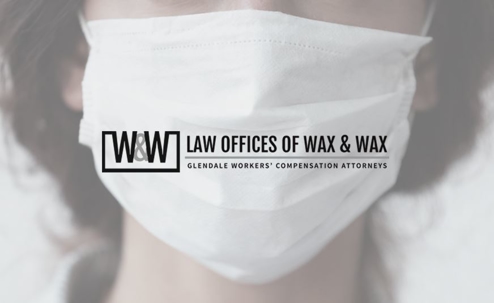The coronavirus pandemic has changed the face of the world in countless ways, including how businesses must run and the rights afforded to workers. In the last few months, new pieces of legislation have been drafted, reviewed, and approved to update employee rights while catching COVID-19 remains a threat at large. To make certain the workers in our communities understand their new rights and benefits, the Law Offices of Wax & Wax in Santa Clarita Valley and Glendale would like to take this opportunity to review a few of the most important legal updates.
Families First Coronavirus Relief Act (FFCRA)
The FFCRA was signed on March 18th, 2020 with the primary goal of providing emergency paid sick leave and emergency family medical leave during the pandemic. It applies to businesses with 51 to 499 employees. Businesses with 50 or fewer employees must only provide the family leave portion of the bill, and businesses with 500 or more employees are exempt from this new policy.
Here are the keynotes of the FFCRA that you should know as a worker in SCV:
- The leaves of absence are meant to be used if you must care for a child who cannot go to school or daycare due to mandatory closures and quarantines.
- You must be employed for at least 30 days before capable of using an FFCRA leave.
- If you are eligible, you can get up to 12 weeks of job-protected leave, with the first 2 weeks being eligible for emergency paid sick leave coverage.
- The first 10 days of using an FFCRA leave can be unpaid if your employer decides it, but your employer cannot force you to use all other forms of available paid leave before using an FFCRA leave.
- After the 11th day and up to 12-weeks of missed work, you can receive at least two-thirds of your regular pay with a $200 daily cap and a $10,000 aggregate cap.
An eligible employer should be receiving additional tax credits for each employee that requires to use an FFCRA emergency paid sick leave or family medical leave. If your employer is saying that they cannot afford to allow your FFCRA leave, then it might be time to speak with one of our attorneys about what to do next.
Senate CARES Act
The Senate Coronavirus Aid, Relief and Economic Security (CARES) Act was signed on March 27th, 2020 to provide stimulus money to businesses with fewer than 500 employees. Its purpose is to keep those businesses afloat while the economy slows due to the pandemic forcing shelter-in-place orders. As an employee, you should know that the CARES Act includes a Paycheck Protection Program that should allow for your employer to continue paying a portion of your wages, even after mandatory closures or a reduction in hours and income.
Important details of the CARES Act Paycheck Protection Program are:
- Only small businesses that are not 501c(3) NPOS with less than 500 employees can qualify.
- Payroll costs might not be covered if your employer is already using another loan program to continue paying employees.
- Regular payroll amounts, commissions, and many employee benefits can be covered by these specific loans.
OSHA Guidelines for Employers & Employees
The Occupational Safety and Health Administration (OSHA) has released an overview of what all employers should do to help keep their employees safe from the coronavirus. You should insist that your employer follows as many of these safety protocols as possible if they are not doing so already.
A few tips from OSHA to encourage coronavirus safety in the workplace are:
- Encourage workers to stay home whenever they feel even slightly ill and to report any concerns they have about spreading the virus.
- Show workers proper respiratory etiquettes, such as hiding coughs and sneezes in the crook of the elbow.
- Establish added handwashing stations, which may include 60% or greater alcohol-based hand rubs.
- Do not let nonessential parties into the workplace.
- Look for ways to allow employees to work remotely or stagger shifts to keep as few employees as possible in the workplace at any given time without reducing hours.
- Instruct employees to never share personal items.
- Create updated and improved cleaning and disinfecting schedules around the workplace.
- Only use cleaners approved by the Environmental Protection Agency and follow packaging instructions.
Workers’ Compensation Updates That Benefit Employees
California Governor Newsom recently updated workers’ compensation guidelines throughout the states to make it easier for essential workers to get workers’ compensation benefits after contracting the coronavirus. Any essential worker who has been diagnosed with COVID-19 can file for workers’ compensation and does not need to prove that they were exposed to the virus in the workplace, as it is now assumed that the exposure did occur while working. If an insurance company wants to deny a coronavirus claim filed by an essential worker, then that company has the difficult challenge of proving the exposure did occur somewhere other than the workplace.
If you need help filing for workers’ compensation in SCV or Glendale as an essential worker, remember that the Law Offices of Wax & Wax can help you. Our attorneys are here to lend a supportive hand during this difficult time. We can provide legal counsel throughout the development of your coronavirus workers’ compensation claim, including representation in case it is wrongfully denied by the responding insurance company.

